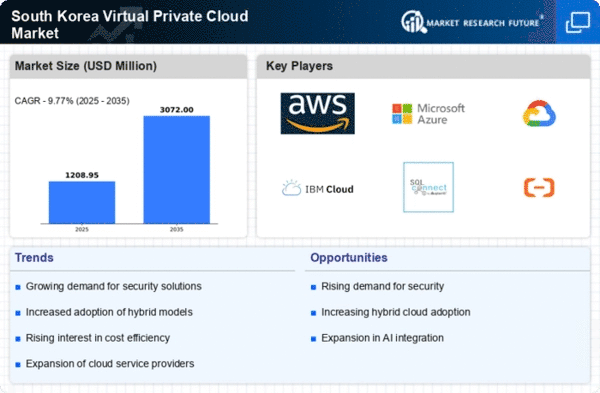Rising Focus on Cost Efficiency
Cost efficiency remains a pivotal driver in the virtual private-cloud market. Organizations in South Korea are increasingly looking to reduce operational expenses while maintaining high performance. The shift from traditional IT infrastructure to virtual private-cloud solutions allows businesses to minimize capital expenditures associated with hardware and maintenance. Reports indicate that companies can save up to 30% on IT costs by adopting cloud solutions. This financial incentive is particularly appealing to small and medium-sized enterprises (SMEs) that may have limited budgets. As a result, the virtual private-cloud market is likely to witness sustained growth as more organizations prioritize cost-effective solutions without compromising on quality or security.
Enhanced Data Privacy Regulations
The virtual private-cloud market is significantly influenced by the evolving landscape of data privacy regulations in South Korea. With the implementation of stricter data protection laws, businesses are compelled to adopt solutions that ensure compliance. The virtual private-cloud market offers enhanced security features that align with these regulations, making it an attractive option for organizations handling sensitive information. As companies strive to avoid hefty fines and reputational damage, the demand for compliant cloud solutions is expected to rise. This regulatory environment not only drives growth in the virtual private-cloud market but also encourages providers to innovate and enhance their security offerings to meet the stringent requirements.
Growing Demand for Scalable Solutions
The virtual private-cloud market in South Korea experiences a notable surge in demand for scalable solutions. Businesses increasingly seek flexible cloud environments that can adapt to their evolving needs. This trend is driven by the necessity for organizations to manage fluctuating workloads efficiently. According to recent data, the market is projected to grow at a CAGR of approximately 15% over the next five years. Companies are recognizing the advantages of virtual private-cloud solutions, which allow them to scale resources up or down based on real-time requirements. This adaptability not only enhances operational efficiency but also optimizes costs, making it a compelling choice for enterprises aiming to remain competitive in a dynamic market landscape.
Increased Collaboration and Remote Work
The shift towards remote work and collaboration tools has a profound impact on the virtual private-cloud market. As organizations in South Korea adapt to new work environments, the need for secure and efficient cloud solutions becomes paramount. Virtual private-cloud services facilitate seamless collaboration among remote teams, allowing for secure access to shared resources. This trend is likely to continue, with a significant portion of the workforce expected to remain remote or hybrid. Consequently, the virtual private-cloud market is poised for growth as businesses invest in solutions that support flexible work arrangements while ensuring data security and accessibility.
Technological Advancements in Cloud Infrastructure
Technological advancements play a crucial role in shaping the virtual private-cloud market. Innovations in cloud infrastructure, such as improved virtualization technologies and enhanced network capabilities, are driving the adoption of virtual private-cloud solutions. These advancements enable organizations to achieve higher performance, reliability, and scalability. In South Korea, the integration of cutting-edge technologies, including artificial intelligence and machine learning, into cloud services is becoming increasingly prevalent. This trend not only enhances operational efficiency but also provides businesses with the tools needed to analyze data more effectively. As technology continues to evolve, the virtual private-cloud market is likely to expand, offering organizations more sophisticated and efficient solutions.
















